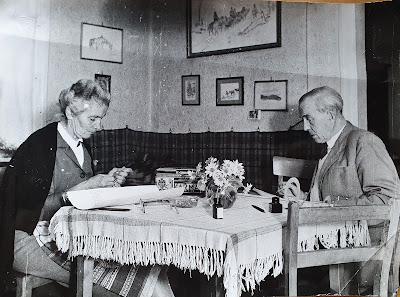 |
| Wanda and Karol Kossak in Ciechocinek |
Back in the very early 1970s, as a young woman, I took a trip to Poland, to stay with my father's relatives in Warsaw, and in a place called Ciechocinek, where my great aunt Wanda and great uncle Karol Kossak (the last of the celebrated family of Polish artists) lived. The picture of them above is so vividly reminiscent of my time there that every time I see it, I'm back with them, sitting at that table. I loved them dearly.
When I came to work on my new book, The Last Lancer, about the Polish grandfather I never met, his turbulent milieu, his family and his life, I found myself remembering them all over again. They were a link to a past that for many years was inaccessible to me. The book is currently with my publisher, and I'm working on all the other elements surrounding it. Meanwhile, it has suddenly become current in the worst possible way, since my family came from that part of Poland called Galicia, much of which is now in Ukraine. That instant 'relevance' is very hard to come to terms with, even though it has cast a blinding light on the tragic past of my forebears.
One thing I keep remembering though. And I tell the tale here because it too is relevant, in the worst possible way.
As part of my trip, my family had arranged a visit to Krakow. Among other things, they organised a trip to the salt mine at Wieliczka. You can get some idea of what a beautiful and intriguing place this is from their website, but even back then, with the communist party still firmly in control in Poland, it was a wonderful place.
I went on a conducted tour with a guide who spoke in Polish and English. At some point during that tour, I became aware of what can only be described as a general sense of unease among the rest of the group. To this day, I can remember the feeling, although at first, I didn't know what it was. It was just short of tangible. A current. A vibration in the air. The kind of feeling that makes you shiver. If I was a cat my fur would have been standing on end!
Then, I noticed that we had, as we moved forward, split into two parties. My group was a mixed bunch of mostly Polish tourists with a couple of English speakers. The other consisted of one grim faced and silent older man, flanked by two other men who occasionally muttered to him. If they had been wearing notices that they were plague carriers, the way in which everyone avoided them could not have been more obvious. We went on with our enjoyable tour, but at some point, an older man from our group bent down and whispered in my ear 'KGB'.
I've never forgotten it. It flashes into my mind occasionally - much more so over the past few weeks. That palpable sense of unease had another element to it, and it was only later that I realised what it was. It was hatred. Something I hadn't encountered at all in my life to that time: raw, primitive hatred. Because some of those Polish tourists had vivid memories of exactly what Russian soldiers had done to them and their families during the war.
Nothing happened. We enjoyed our tour, the unwelcome guests got into a fancy car and drove off - and I resumed my holiday. But once you've encountered the reality of justified hate, you never forget it and the force of it. Like my father you can choose not to allow it to ruin your life, but there will be times when it surfaces, just as it surfaced on that long ago day, even though we were deep underground.
1 comment:
Chilling reading, Catherine. One can only weep and wonder why hatred exists. When we went to Poland in 1974 on a botanical trip we saw a lot of poverty and were met with envious looks.The experience made me feel guilty. Children were begging in the streets and we were told not to walk about with cameras or binoculars on show. We stayed in Zakopane and had a day in Cracow, the rest of the time we were in the mountains. Richard is interested in railways and we ventured off the main streets to find a place where he could see trains passing and found ourselves in what I can only describe as a poverty-stricken shanty town.I don't think we were in danger but we were suddenly surrounded and met with hostile looks. We felt obliged to beat a hasty retreat. Someone told us later that if they'd known we were English our reception would have been different.
Post a Comment